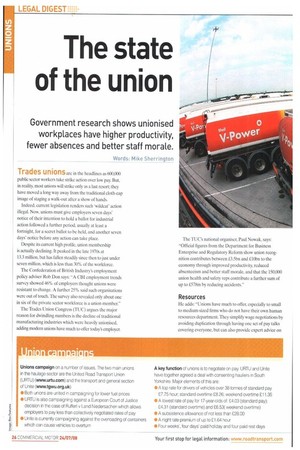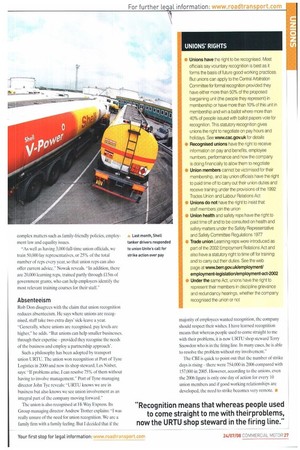The state of the union
Page 26

Page 27

If you've noticed an error in this article please click here to report it so we can fix it.
Government research shows unionised workplaces have higher productivity, fewer absences and better staff morale.
Words: Mike Sherrington Trades unions are in the headlines as 600,000 public sector workers take strike action over low pay. But, in reality, most unions will strike only as a last resort; they have moved a long way away from the traditional cloth-cap image of staging a walk-out after a show of hands.
Indeed, current legislation renders such 'wildcat' action illegal. Now, unions must give employers seven days' notice of their intention to hold a ballot for industrial action followed a further period, usually at least a fortnight, for a secret ballot to be held, and another seven days' notice before any action can take place.
Despite its current high profile, union membership is actually declining. It peaked in the late 1970s at 13.3 million, but has fallen steadily since then to just under seven million, which is less than 30% of the workforce.
The Confederation of British Industry's employment policy adviser Rob Don says: "A CBI employment trends survey showed 46% of employers thought unions were resistant to change. A further 25% said such organisations were out of touch. The survey also revealed only about one in six of the private sector workforce is a union member."
The Trades Union Congress (TUC) argues the major reason for dwindling numbers is the decline of traditional manufacturing industries which were heavily unionised, adding modern unions have much to offer today's employer. The TUC's national organiser, Paul Nowak, says: "Official figures from the Department for Business Enterprise and Regulatory Reform show union recognition contributes between £3.5bn and £10bn to the economy through improved productivity, reduced absenteeism and better staff morale, and that the 150,000 union health and safety reps contribute a further sum of up to £578m by reducing accidents."
Resources He adds: "Unions have much to offer, especially to small to medium-sized firms who do not have their own human resources department. They simplify wage negotiations by avoiding duplication through having one set of pay talks covering everyone, but can also provide expert advice on complex matters such as family-friendly policies, employment law and equality issues.
"As well as having 3,000 full-time union officials, we train 50,000 lay representatives, or 25% of the total number of reps every year, so that union reps can also offer current advice," Nowak reveals. "In addition, there are 20,000 learning reps, trained partly through f15m of government grants, who can help employers identify the most relevant training courses for their staff."
Absenteeism Rob Don disagrees with the claim that union recognition reduces absenteeism. He says where unions are recognised, staff take two extra days' sick-leave a year. "Generally where unions are recognised, pay levels are higher,he adds. "But unions can help smaller businesses. through their expertise -provided they recognise the needs of the business and employ a partnership approach'.
Such a philosophy has been adopted by transport union URTU. The union won recognition at Port of Tyne Logistics in 2000 and now its shop steward, Les Nisbet, says: "If problems arise, I can resolve 75% of them without having to involve management." Port of Tyne managing director John Tye reveals: "URTU knows we are in business but also knows we see union involvement as an integral part of the company moving forward."
The union is also recognised at Hi Way Express. Its Group managing director Andrew Trotter explains: "I was really unsure of the need for union recognition. We are a family firm with a family feeling. But I decided that if the majority of employees wanted recognition, the company should respect their wishes. I have learned recognition means that whereas people used to come straight to me with their problems, it is now URTU shop steward Terry Snowdon who is in the firing line. In many cases, he is able to resolve the problem without my involvement."
The CBI is quick to point out that the number of strike days is rising there were 754,000 in 2006 compared with 157,000 in 2005. However, according to the unions, even the 2006 figure is only one day of action for every 10 union members and if good working relationships are developed, the need to strike becomes very remote. al




























































































































































